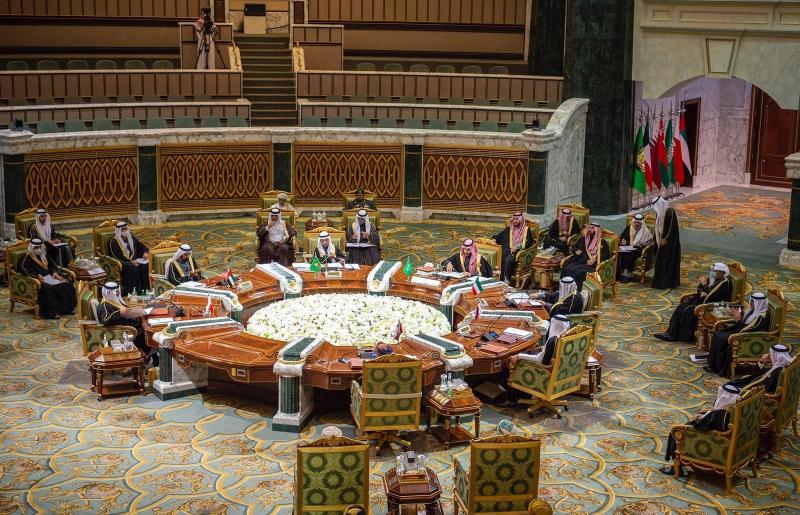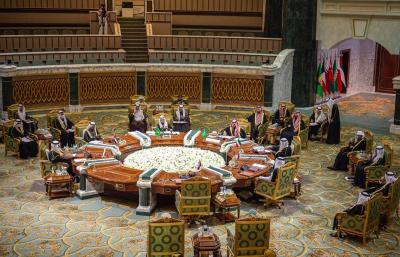The 44th summit of the Gulf Cooperation Council (GCC) at the leaders' level commenced today in the Qatari capital, Doha, with prominent issues including Israel's war on Gaza and Gulf economic unity topping the agenda. The summit was opened by Qatar's Emir Sheikh Tamim bin Hamad Al Thani, who stated in his opening speech that the summit "comes at a time we hope will contribute to understanding and communication among leaders to develop and enhance joint Gulf action that serves our countries’ interests, meets the aspirations of our peoples, and strengthens the strategic position of the GCC regionally and internationally, creating greater opportunities for growth and prosperity."
He emphasized that "fast-moving international and regional changes require ongoing consultation and coordination among the member states to address them." The Emir noted that the summit is being held amidst "a grave tragedy and an unprecedented humanitarian disaster resulting from the aggression faced by the Palestinian people, especially in Gaza."
He added that "in occupied Palestine, all religious, moral, and humanitarian standards and values have been violated through the crimes against humanity committed by the occupying forces. Despite the exposure of the extent of the crime, some official circles still deprive the Palestinian people of the demand for a ceasefire."
He deemed it a disgrace for the international community "to allow the continuation of this heinous crime, which has involved systematic and intentional killing of defenseless innocent civilians, including women and children, for nearly two months." He stated that his country continues to work towards extending the ceasefire in Gaza and confirmed that it "is not a substitute for a permanent ceasefire."
He called on the UN Security Council to compel Israel to return to the negotiating table regarding the war in Gaza. The Emir noted that "families have been completely erased from civil registries, and fragile infrastructure has been targeted, along with cutting off electricity, water, and fuel supplies, and the destruction of hospitals, schools, and vital centers—all under the pretext of self-defense, although self-defense does not apply to occupation according to international law, nor does it justify the massacres being committed by Israel."
He stressed that "these massacres deepen the sense of injustice and the ineffectiveness of international legitimacy, but the other side of this tragedy is the resilience of the Palestinian people and their determination to achieve all their legitimate rights and the centrality of the Palestinian issue." He continued, "All this suffering could have been avoided if Israel and its supporters realized that the Palestinian people's issue cannot be marginalized, that the era of colonialism has passed, and that security is not possible without lasting peace, both of which cannot be achieved without a just resolution to this issue."
Emir Tamim bin Hamad renewed his condemnation of the targeting of civilians of all nationalities and religions and stressed the necessity of providing them protection according to the provisions of international humanitarian law, calling on the United Nations to conduct an international investigation into the massacres against the Palestinian people.
For his part, GCC Secretary-General Jasem bin Mohammed Albudaiwi called on the international community to "assume its responsibilities, work first to ensure an immediate ceasefire, and facilitate the entry of humanitarian aid into Gaza," in addition to "activating a credible peace process leading to a two-state solution that ensures security and peace in the region and protects civilians."
Albudaiwi began his speech at the GCC summit by stating, "Today, we find ourselves surrounded by evident hardships, especially what we witness in the heinous blood crimes being committed against the Palestinian people in Gaza."
He quoted part of the first final communiqué of the GCC in 1981, which stated that "ensuring stability in the Gulf is linked to achieving peace in the Middle East, reflecting the necessity of solving the Palestinian issue in a just manner that secures the legitimate rights of the Palestinian people, including their right to return to their homeland and establish their independent state, and ensuring Israeli withdrawal from all occupied Arab territories, especially Jerusalem."
The GCC Secretary-General added in his speech: "We still emphasize the dangers of the continued occupation and the deprivation of the Palestinian people of their rights on one hand, and the repeated systematic provocations against their sacred sites on the other."
Turkish President Recep Tayyip Erdoğan stated that Israeli Prime Minister Benjamin Netanyahu risks the future of the entire region for his political calculations. In his speech during the summit as a guest of honor, Erdoğan highlighted that "the killing of thousands of children and women is a war crime and a crime against humanity, and Israel should be held accountable for that." He affirmed, "We hoped that the ceasefire would be permanent, but unfortunately that has not happened," stressing that "our goal is to reach a Palestinian state with independence and sovereignty on the 1967 borders, with East Jerusalem as its capital."
He noted that "our relations with Gulf countries are developing day by day," indicating that "the volume of trade between the GCC states and Turkey has seen significant growth, reaching $23 billion."
The Qatari Emir Sheikh Tamim bin Hamad Al Thani welcomed Saudi Crown Prince Mohammed bin Salman, UAE President Sheikh Mohammed bin Zayed, Bahrain King Hamad bin Isa Al Khalifa, Oman's Deputy Prime Minister Fahd bin Mahmoud Al Said, who is attending on behalf of Sultan Haitham bin Tariq, and Kuwait's Foreign Minister Sheikh Salem Abdullah Al Jaber, representing Kuwait's Amir Sheikh Nawaf Al-Ahmad Al-Jaber.
The Gulf summit comes at extraordinary circumstances in the region, with Israel resuming its war on Gaza after a ceasefire that lasted only a few days, which had been achieved through Qatari, Egyptian, and American mediation. The GCC states are making diplomatic efforts to stop the war, including hosting the "Arab-Islamic Summit" in Saudi Arabia's capital, Riyadh, last November.




